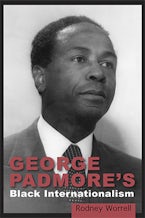In George Padmore’s Black Internationalism, Rodney Worrell traces the main features of Padmore’s social and political thought. Worrell explores Padmore’s use of the ideologies of Marxism and pan-Africanism as vehicles to liberate Africa and the Caribbean from the grip of European imperialism. As an engaged Marxist revolutionary, Padmore played a leading role in the Soviet Union’s black internationalism project during the early 1930s. After he severed his ties with the Comintern, he became one of the leading pan-African activists in Britain from the mid-1930s until he migrated to Ghana in 1957, where he made his mark as a member of the International African Service Bureau, the Pan-African Federation, and in organizing the Fifth Pan-African Congress in Manchester, England, in 1945. Padmore became a major theorist of the unification of the African continent and worked assiduously to see this become a reality as Kwame Nkrumah’s advisor on African affairs.
Worrell provides a sound and thorough account of Padmore’s strident anti-imperialism and radical anti-colonial critiques while simultaneously outlining his championing of self-determination. This engrossing work scrutinizes Padmore’s political praxis and illuminates his invaluable contribution to pan-Africanism and his dedication to the liberation of Africa and the Caribbean from colonial rule.

